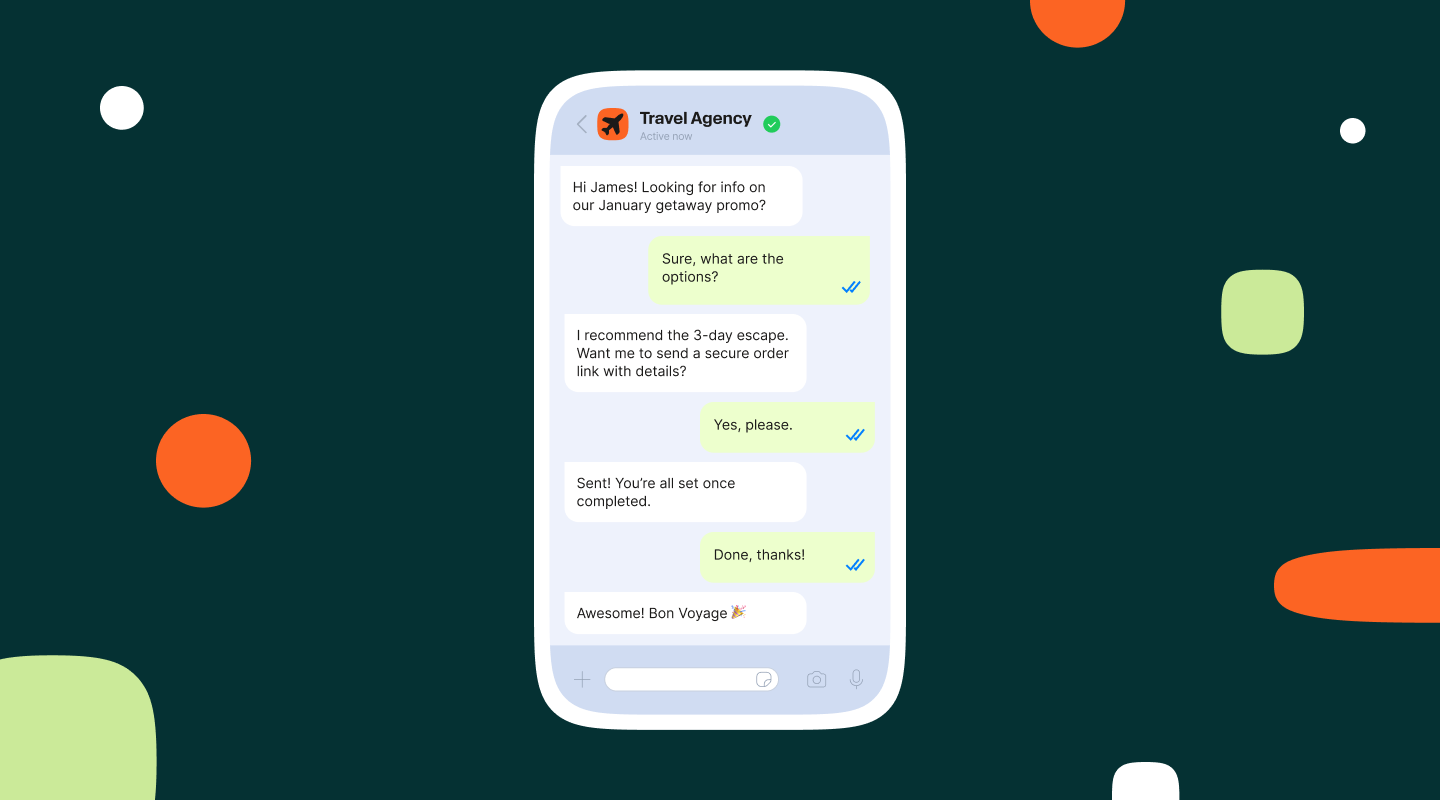RCS vs WhatsApp in 2025: Choosing the right channel
Compare WhatsApp Business and RCS for Business in 2025 – considering user reach, features, security, pricing, and sector‑specific use cases to choose the right channel for your business messaging.

Messaging has become the default way customers connect with brands worldwide. In 2025, WhatsApp Business and RCS for Business (RCS) both deliver dynamic, trusted conversations at scale, but they do so in different ways.
WhatsApp reportedly serves more than 3 billion active users, with around 140 billion messages sent daily, while RCS has passed roughly 1.5 billion users and is accelerating since Apple introduced native RCS support in iOS 18. These shifts, plus stricter compliance and the push for multi-channel engagement, make comparing both channels essential before you plan which one to use for campaigns, service messages, and authentication.
To be confident in your choice, we’ll examine and compare features, security, pricing, use cases, and sector fit, before closing with a practical decision framework that you can apply today.

RCS vs WhatsApp: Overview
Choosing the right channel starts with a look at how each platform works and how businesses use them.
WhatsApp Business Platform
Brands that use WhatsApp to communicate with customers must either use the WhatsApp Business App or the WhatsApp Business platform (click here for an overview of the differences). Companies use the WhatsApp Business Platform to send notifications, marketing, and support messages to opted-in users. It offers rich media, templates, flows, and payments, backed by verified sender profiles.
WhatsApp communication is end-to-end encrypted, with no exceptions. This applies to both P2P and A2P traffic, making WhatsApp a very secure channel for private communication. This is a key consideration as while RCS messages are also encrypted in most cases, there are some scenarios where they are not. We’ll examine this a little deeper later on.
RCS for Business
Rich Communication Services (RCS) is a messaging protocol supported by Google which is aimed at introducing more advanced features like rich media and suggested actions, without the need to download additional apps. For instance, a recipient would receive RCS messages in the same inbox as SMS and MMS messages. It’s a carrier-based protocol built into the native messaging app on Android and increasingly iOS, with iOS 18 support and follows the Universal Profile standard. Consent is handled at the carrier level, and sender verification is operator-backed.
For interactions between two Android device users who have RCS messaging enabled on their phones, messages are delivered over the internet using mobile data network or Wi-Fi. However, if someone using RCS sends messages to a person using iMessage on an iPhone, or another non-supported device, then the message will be delivered as an SMS or MMS. If SMS, then any rich media included with the message would be discarded.
Comparing user experience
WhatsApp offers a consistent, instantly recognizable interface across devices, while RCS messages appear natively in users’ default Android inboxes. With Apple devices supporting RCS, its familiarity and adoption are set to grow, narrowing the recognition gap.
Both paths are powerful. WhatsApp thrives on reach and commerce features, while RCS excels at native, rich messaging with operator trust.
Features comparison: WhatsApp Business vs RCS for Business in 2025
Both support rich media, receipts, typing indicators, and groups; WhatsApp offers business-specific tooling like templates and flows; RCS offers branded verified sender and suggestions. Let’s examine some other differences in more detail:
| Feature | WhatsApp Business Platform | RCS for Business |
|---|---|---|
| User base and availability | Over 3 billion active users; app installation required | Around 1.5 billion users and growing; native messaging app |
| Multimedia and interactivity | Images, videos, stickers, documents, buttons, lists, flows, catalogs, payments for conversational commerce, webview, product & multi-product messages, business calling | Images, videos, buttons, rich carousels, chip lists, calendar entries, webviews, Google Wallet files; lacks full catalogs/carts |
| Verification and branding | Meta-verified business profiles with blue checkmark; authenticated sender identity | Carrier verification with branded logos and colors and blue checkmark; operator-backed trust |
| Security and compliance | End-to-end encryption between the business partner and the user; explicit user opt-in; requires governance for audit, retention, and regulatory needs | Transport-layer encryption (TLS), carrier verification reduces fraud; end-to-end encryption planned; compliance tooling is maturing |
| Pricing and cost | Conversation-based pricing moving to per-message categories (marketing, utility, authentication, service) after July 2025; rates set by Meta | Pay-as-you-go or monthly active user models; regional and message-type variation; often cost-effective for marketing bursts |
| Integration and APIs | Mature APIs, webhooks, easy integrations with CRM, eCommerce, marketing, and contact centers; robust analytics | APIs improving but vary by carrier; CPaaS failover is key to achieve global coverage and reliability |
| Omnichannel orchestration | Orchestrates journeys with SMS, RCS, Telegram, Viber alongside WhatsApp via CPaaS for unified customer experience | Works well as part of an orchestrated stack; use CPaaS to route, failover, and consolidate reporting across regions |
In summary – each channel brings its own unique strengths. If you need global commerce and mature integrations, WhatsApp leads. If you value native reach, plus rich interactive campaigns with operator trust, RCS shines.
Security and compliance: What to know before you scale
Security and compliance determine the viability of particular channels in regulated sectors. Below, we look at how both WhatsApp and RCS approach protection, trust, and governance.
WhatsApp security considerations
WhatsApp provides end-to-end encryption between the business partner and the user, which supports privacy for service, transactional, and support flows. For regulated industries, businesses must capture and retain records, apply access controls, and meet audit requirements. This includes data retention aligned to frameworks like GDPR or HIPAA, plus policy enforcement and reporting for legal defensibility.
RCS for Business security considerations
RCS utilizes a layered security approach. Messages are transport-layer encryption (TLS) with operator-backed verification using industry standards. Businesses need to register and verify their accounts with mobile network operators or RCS messaging providers as part of the RCS for Business onboarding process. This ensures compliance with telecom regulations and enables verified sender status, which is critical for trusted communications. RCS’s carrier verification model is attractive to sectors that value trusted sender identity, and its compliance tooling is improving each year. It’s worth noting that end-to-end encryption is planned for the future.
In summary, when security and compliance are non-negotiable, WhatsApp’s current end-to-end encryption is a strong plus, while RCS’s verified sender model and evolving encryption roadmap make it a compelling alternative, especially when combined with CPaaS guardrails.
Business use cases and sector-specific examples
Both channels support modern customer journeys. Below are the most common scenarios and which channel tends to fit best. Use this as guidance, not a rule.
Interactive marketing
WhatsApp supports in-chat payments in supported markets and commerce flows with catalogs, ideal for webviews and conversion-driven campaigns at global scale.
RCS is built for immersive promotions. Rich carousels, chip lists, suggested replies, and branded layouts boost engagement for product discovery and seasonal campaigns. It supports payment links and Google Wallet passes or webviews.
Customer support and engagement
WhatsApp templates, chatbots, agent handover, and real-time flows deliver personalized service and proactive updates, with analytics to optimize interactions. RCS supports urgent alerts, polls, and surveys and can deliver messages faster in some markets, which is helpful for service notifications and rapid feedback loops.
Chatbot support
WhatsApp offers a mature chatbot ecosystem, no-code builders, and sophisticated agent handover. RCS supports chatbots and is improving as businesses can begin messaging customers who have opted in.
Authentication and OTPs
Both channels handle OTPs and step-up authentication. WhatsApp’s encryption supports privacy-sensitive confirmations. RCS can pair with SMS fallback via CPaaS to raise delivery success for account protection across devices and regions.
Sector-specific considerations
Retail teams often favor RCS for rich, interactive browsing, plus WhatsApp for checkouts and repeat purchases. Financial services lean to WhatsApp for encryption, while adopting RCS for verified sender alerts and engagement. Healthcare combines RCS for appointment reminders and pre-visit instructions with WhatsApp for secure, consent-led patient conversations.
Infobip has enables conversations on both WhatsApp and RCS to help businesses create meaningful, informative communication with their customers, clients or patients.
A practical checklist for choosing the right channel
We have compiled the following checklist to help you choose the channel that best aligns with your business goals, budget, and existing technology stack.
- Integration and architecture: Confirm your CRM, eCommerce, and contact center integrations. WhatsApp’s APIs and ecosystem are mature with many out-of-the-box options. RCS integrations may rely on carriers, so plan for CPaaS failover and routing to ensure global delivery.
- Compliance and security: Map regulatory requirements by region and use case. If end-to-end encryption is essential today, WhatsApp is ready. If verified sender identity plus transport encryption meets your needs, RCS can fit, especially with CPaaS governance for logging and retention.
- Customer experience: Identify device distribution and channel preferences. Choose WhatsApp for global reach and commerce flows. Choose RCS for rich, interactive campaigns and operator-trusted experiences, especially where carrier support is strong.
- Cost considerations: Model spend across pricing approaches. WhatsApp has transitioned to per-message categories after July 2025. RCS pricing varies by region and can be efficient for high-volume promotions. Be sure to balance costs with expected engagement and conversion lift. Remember, costs vary by provider and region; RCS can be more cost effective for high-volume marketing.
- Multi-channel and failover: Plan to use both channels for coverage and resilience. Orchestrate journeys that start on one channel and fail over to another, and consolidate analytics for end-to-end visibility.
By applying this framework, most brands uncover a blended approach that maximizes reach, trust, and ROI. Ultimately, when you use both channels side by side based on region, customer preferences, and cost, businesses get the best of both worlds.
Next steps: Achieving success with RCS or WhatsApp
Both WhatsApp and RCS are highly effective channels for business communication, particularly rich, conversational interactions. They are closely matched when it comes to the features available to users. This is why the choice of whether to use RCS or WhatsApp as your main communication channel isn’t necessary. You can easily incorporate both into your communication strategy and have them work in tandem. How exactly? Choose the ideal channel for each use case, taking into account the region, customer preferences, and cost. Easier said than done? Possibly, but we have a solution to find that perfect balance.
Infobip offers a comprehensive solution to orchestrate both channels end to end. Our platform includes WhatsApp Business Platform and RCS as part of an omnichannel stack with verified sender onboarding, proactive compliance support, advanced analytics, and native integrations with your CRM, eCommerce, and contact center systems. As a WhatsApp Business Solution Provider and Meta partner, Infobip delivers innovations like flows and payments, backed by global support and 24/7 expertise.
FAQs
RCS is carrier-based and built into the native messaging app, now spanning Android and iOS 18. WhatsApp is an over-the-top app with a larger global user base and requires installation. Both support business messaging, rich media, and verification, but they differ in encryption status, pricing models, and ecosystem maturity.
WhatsApp currently offers end-to-end encryption between the business partner and the user, which supports privacy-sensitive use cases. RCS uses transport-layer encryption with carrier verification with plans to introduce end-to-end encryption. Many regulated organizations combine RCS with CPaaS governance to meet audit and retention requirements.
.
Yes. Most enterprises benefit from using both through a CPaaS provider for broader coverage, failover, and customer preference alignment. Infobip orchestrates WhatsApp, RCS, and more in a single platform with shared analytics.
RCS’s native rich media and interactive design often lift engagement for promotional campaigns. WhatsApp’s global reach and conversational commerce features can drive high conversion and lifetime value. It is best to evaluate by region, audience, and campaign type, then test and measure to achieve the highest possible engagement rates.
No. WhatsApp is an over-the-top messaging app that uses its own protocols and encryption. RCS is a carrier-based messaging standard in native messaging apps. They are separate channels with different delivery and trust models.














